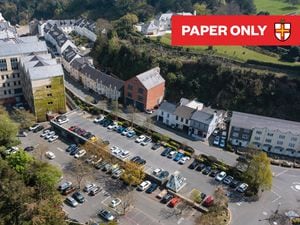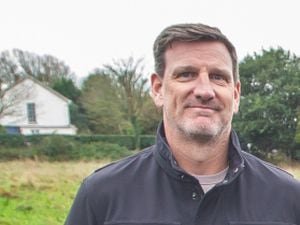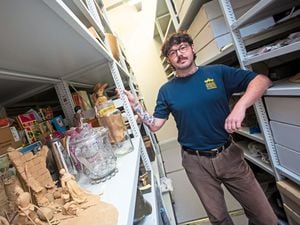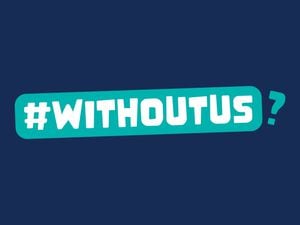Ian relishes the power game's new challenges
Guernsey Electricity managing director Ian Watson's career has taken him from Manchester to Cornwall, Papua New Guinea, Singapore and Australia - and ultimately to settle here. He spoke to Rosie Allsopp
Guernsey Electricity managing director Ian Watson's career has taken him from Manchester to Cornwall, Papua New Guinea, Singapore and Australia
- and ultimately to settle here. He spoke to
Rosie Allsopp IAN WATSON has seen Guernsey Electricity through some of the most momentous periods in its history and come out smiling.
'It's the biggest challenges that bring the biggest satisfaction,' said Mr Watson, who oversaw the £30m. investment in the submarine cable link to Europe.
The massive project linked the island to France and the European power network. Including Jersey's investment, the cost totalled £50m., making it one of the largest capital projects seen in the islands.
'To everyone's credit it came in on time and on budget.'
He was also at the helm when the company became commercialised - initially a turbulent time for the newly formed company. Part of that was because of the introduction of new staff contracts.
Initially more than 100 refused to sign but after much negotiation, all but nine eventually did so. Since then, relations with staff have kept improving.
'Compared to commercialisation, the cable link was far more straightforward.
'When you look back, it seems inevitable that there would be some difficulty and it wasn't nice the way it ended, but we had to move forward or we might as well never have been commercialised,' he said.
He joined as GE's finance director in 1992 and was appointed to the top post in 1995.
'Those two big things were going on at the time - the submarine cable and commercialisation - which were going to change the company significantly. I would be taking the lead role in these long-term projects and I knew I would relish the challenge. I knew I could make a significant contribution.'
His drive to succeed came when he was a teenager, going from disinterested student to being bitten by the exam bug almost overnight.
'A year into my business studies course I saw friends falling by the wayside and realised I would have to knuckle down,' he said.
So I started studying and really turned the corner, so much so that I didn't want to stop studying.'
After passing the accountancy qualification with flying colours, he was spurred on even further.
'I saw the letters after my boss's name, FCCA FCIS, and I wanted that.
'When I got those two sets of letters I couldn't have wished for better. My career was progressing at some rate.'
Originally from Swinton, Manchester, Mr Watson's first job was with GEC.
It was one of the most respected companies around at the time and while he was working in the north-west, he craved the chance to spread his wings.
'I had been there for eight years when they sent me to Singapore with a remit to sort out a company that they owned there. GEC couldn't understand the results they were getting.'
He was sent for a year but had figured out what was wrong in a fortnight. He returned when his time was up to be offered a position that didn't appeal.
'You can never go back when you've had a year away. I stuck it for about 12 months but having been to Singapore I'd been bitten by the travel bug.
'I said: ?Let's go somewhere nice, I can always get a job.? Every company in every country has an accountant so I'd never be out of a job.'
Somewhere nice turned out to be St Ives, Cornwall, working for Devenish Brewery. It was as different from GEC as it could be.
'I loved it. It was an almost perfect job in a perfect place. One perk was going into the sample room every Friday night.'
But after a while, he realised there is no such thing as the perfect job in the perfect place. The need to answer the call of the travel bug was exacerbated by the breakdown of his first marriage.
'I went for three jobs: one in Bermuda, one in Long Island and one for the Steamship Trading Company in Papua New Guinea and Australia.'
The last-named was as far from England as one could get, geographically and culturally, and he duly set sail to start a four-year contract.
He lived in the capital, Port Moresby, with no intention of starting a relationship but met Michelle, a Melanesian from the north of the island.
'She was so bright that the whole village collaborated together to help send her to university in Port Moresby.'
They fell in love and when Mr Watson's four years were up, he faced a quandary.
'We knew we wanted to get married and wanted children but we couldn't live in Papua New Guinea because it wasn't safe. Law and order, when it became independent from Australia, went out of the window.'
The couple came back to the UK so Michelle could meet his family. It was then that he saw the finance director's job advertised at Guernsey Electricity.
'As soon as I saw the annual report, I knew I could bring something to the party.'
He assumed that Michelle would want to return home and was pleased to be wrong.
'She said we should apply for the job and has settled here from day one.'
The couple's daughter, Heather, was born shortly after they arrived. She is a talented tennis player and recently became the British national champion. She is currently honing her skills at the exclusive Bollettieri academy in Florida.
Her parents aren't bad at sport either.
Mr Watson is a keen racketball player and is on the court as often as possible.
His next big challenge at Guernsey Electricity is technology-based.
First is the switch to fully automated metering, which could be a world first for the power provider.
The project has already attracted international recognition and a major industry award.
The second is tidal power. The company has invested in pioneering research into the technology which Mr Watson one day hopes to see installed in local waters.
'We have high hopes for this technology. We believe it is ideally suited to Guernsey and one day tidal power could make a significant contribution towards the island's technology needs.'
And his love of studying has not deserted him. He was recently made a chartered director, an achievement he says is 'excellent for the island'.
'Going back to studying after all those years was amazing. It was a nice challenge.'





